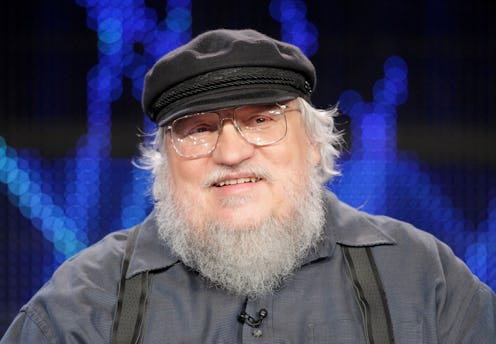Game of Thrones has run into its share of controversy since its debut on HBO back in 2011, and generally for a fairly consistent reason. As its source material, George R. R. Martin's A Song Of Ice And Fire has, the series has repeatedly used violence against women to shock or drive the plot forward — for instance, this season, we saw Sansa brutalized by her new husband, Ramsay Bolton, on screen, and back in Season 4, there was that now-infamous Jaime and Cersei scene. After the latest hailstorm of criticism involving the controversial Sansa storyline, Martin defended Game of Thrones' use of violence against women in a conversation with Entertainment Weekly — and in the process he completely missed the point as to why fans are so angry.
Martin has always been straightforward about the fact that the A Song of Ice and Fire series is set in a fictionalized version of the Middle Ages, and that the Middle Ages were not kind to women. As Martin is quick to point out, "The Middle Ages were not a time of sexual egalitarianism," Martin says in the interview. "It was very classist, dividing people into three classes. And they had strong ideas about the roles of women. One of the charges against Joan of Arc that got her burned at the stake was that she wore men’s clothing — that was not a small thing."
So, here, Martin makes a valid a point. His story is set in a world meant to mirror our own, and violence against women was a reality — then just as it is a reality now, albeit in a different way. Given that his goal is to tell a fantasy story grounded in history, no one is going to argue that there should be no violence. The world of Westeros is a dark and dangerous place for both men and women, so death and violence are a huge part of the characters' lives. However, if Martin's aim is authenticity, then he needs to brush up on his research.
Recently, one intrepid reader of A Song of Ice and Fire tallied up the number of sexual assaults in the books (please be aware the link includes graphic descriptions). The total? A staggering 214 instances so far. On the subject of sexual violence in his books, Martin says, "And then there’s the whole issue of sexual violence, which I’ve been criticized for as well. I’m writing about war, which what almost all epic fantasy is about. But if you’re going to write about war, and you just want to include all the cool battles and heroes killing a lot of orcs and things like that and you don’t portray [sexual violence], then there’s something fundamentally dishonest about that."
Looking back at the Middle Ages, Martin is actually wrong. He could tell a completely honest story with a lot less sexual assault. Last year, Live Science compared Game of Thrones to the real Middle Ages and found the show was spot on in some depictions of ancient life, but way off in others. One of the areas Game of Thrones fails in is the frequent use of sexual violence — and by 1285, rape was a punishable offense in the eyes of the law. When was the last time anyone on Game of Thrones was tried for rape?
Martin goes on to emphasize how he could not have told an honest story with less sexual violence. "I want to portray struggle," he says in conclusion. "Drama comes out of conflict. If you portray a utopia, then you probably wrote a pretty boring book."
The problem with Martin's stance is there is more than one type of conflict for women. There is now, and there is then. Focusing so much energy on sexual assault suggests to readers and viewers that women's primary form of struggle, of fear, of pain should be sexual assault. In truth, it's an easy way to drive home the horror of the world because sexual assault is horrific — but, as he admits in his final statement, he wants to write a drama full of action and conflict, and for that to happen, there needs to be some sort of balance. It's important that authors, particularly male authors, know there are other types of conflict for women in stories set during this time that do not involve sexual violence.
Martin has created truly well-crafted, fascinating women. Some are strong physically, others emotionally, some are dreamers, hopeless romantics, pragmatists, and warriors. There are queens and wildlings and peasants — each of these women have rich interior lives. Martin seems to feel readers want him to create an egalitarian society of blissful unity, though — even though, as a fan myself, I'm not sure that's really the issue here. I don't want a utopia, I want conflict. The issue here, really, is that Martin creates iconic female characters, but he does not recognize how he limits them and himself by continuously employing sexual assault as the only way to cause strife in their lives, or to drive home the horrors of war.
By not acknowledging that the criticism of his use of violence against women could be valid, Martin is missing the real issue. "To be non-sexist, does that mean you need to portray an egalitarian society?" Martin says. "That’s not in our history; it’s something for science fiction."
And if writers continue to believe and perpetuate the idea that violence against women in fiction is an acceptable way to drive the plots of men forward with little to no thought of how it affects women, then history is doomed to keep repeating itself.
Images: Giphy (4)
